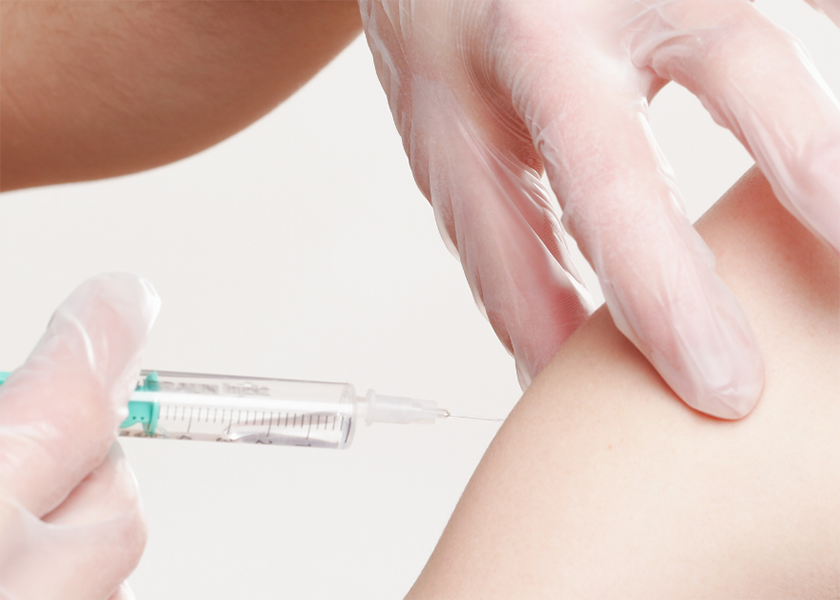8 Things You Should Know About the COVID-19 Vaccine

Pork producers are among the food and agriculture worker segment encouraged to get the COVID-19 vaccine because they play a critical role in ensuring food security. Whether you work in a swine barn or manage a team on the front lines of the pork industry, it’s important to keep in communication with your state pork association or state and local public health department to determine when you or your employees can receive the vaccine.
The National Pork Board shares eight important things the swine industry should know about the COVID-19 vaccine.
1. There are currently two COVID-19 vaccines available for use in the U.S.
The FDA has issued two emergency use authorizations to help protect individuals against the COVID-19 virus. The vaccines created by Pfizer-BioNTech and Moderna are currently the only two vaccines authorized, however additional vaccines are currently in clinical trials. The Pfizer-BioNTech vaccine requires two doses delivered 21 days apart and is available to individuals 16 years and older. It is 95% overall effective at preventing symptomatic COVID-19 infection. The Moderna vaccine requires two doses delivered 28 days apart and is available to individuals 18 years and older. It is 94.1% overall effective at preventing symptomatic COVID-19 infection.
2. The safety of the COVID-19 vaccines is a top priority.
“In the U.S. there are safety process in place to ensure vaccines are as safe as possible,” says Dr. Heather Fowler, Director of Producer and Public Health at the National Pork Board. “The FDA maintains rigorous safety standards for vaccine developers.”
The vaccines are tested in large clinical trials to make sure they meet safety standards and are tested on individuals of different ages, races, ethnicities and medical conditions. FDA and CDC have expanded their vaccine monitoring to track potential problems or side effects not discovered in clinical trials, according to experts at Johns Hopkins Medicine.
According to the CDC, side effects are not uncommon after receiving a COVID-19 vaccine and can include pain and swelling in the arm at the injection site, fever, chills, tiredness or headaches. These side effects should disappear within a few days and is a normal sign that your body is building protection against the virus. If you’ve had previous allergic reactions to vaccines, it’s important to consult with a medical professional first before getting the COVID-19 vaccine.
3. FDA-authorized COVID-19 vaccines cannot give you COVID-19.
These FDA-authorized COVID-19 vaccines do not contain the live virus that causes COVID-19, Fowler emphasizes. You cannot get COVID-19 from these authorized vaccines.
4. The COVID-19 vaccine is free.
The vaccine doses purchased with U.S. taxpayer dollars will be administered to the American people at no cost, CDC says. However, certain providers may charge a fee for the administration of the vaccine.
5. It’s not known how long immunity from the COVID-19 vaccine will last.
Researchers are monitoring how long immunity from the COVID-19 vaccine will last and are looking into how long those who have been previously infected with COVID-19 have natural immunity, Fowler says.
6. Vaccination is recommended, even if you’ve had COVID-19.
It is possible to get re-infected with COVID-19. Even if you’ve previously been diagnosed with COVID-19, CDC recommends that you should still get the vaccine.
7. The COVID-19 vaccine is one tool to help slow the spread of the virus and end the pandemic.
“Vaccines will not end the COVID-19 pandemic overnight,” Fowler says. Follow other precautions such as wearing a face covering, social distancing, handwashing and other hygiene measures should continue to be practiced until public health officials say differently, even if you are fully vaccinated.
8. CDC is providing vaccine administration recommendations.
The U.S. has a limited supply of the COVID-19 vaccines at present. Because of this, CDC is providing recommendations to federal, state and local governments on who should be vaccinated and when. However, each state determines their own vaccine rollout protocols.
Download an information sheet from the National Pork Board here.
More from Farm Journal's PORK:
What Should You Do if Your Farm Employees Test Positive for COVID-19?
7 Things to Help You Respond to a Postiive Case of COVID on the Farm
Medical Doctors and Swine Veterinarians Team Up to Fight COVID-19







